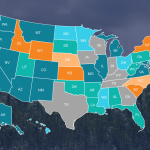Over the past few years, Delta-8 THC has made headlines as a form of “THC-lite.” Since the 2018 Farm Bill legalized the production of hemp as long as the Delta-9 content stays below 0.3%, Delta-8 manufacturers and retailers have found themselves in a legal gray zone. Now, states must decide for themselves whether to allow the sale and possession of Delta-8 or ban it altogether.
What is Delta-8?
Delta-8 is an isomer to the THC everyone knows, otherwise known as Delta-9. As isomers, they consist of the same makeup of atoms and are almost identical. The only molecular difference is the location of their double bond. Since the proton is in a slightly different place on Delta-8 than it is in Delta-9, it binds to receptors in the human body differently.

The effect is still psychoactive and intoxicating, but on a much less potent scale. Theoretically, Delta-8 should also have similar medicinal benefits as medical cannabis, however, more studies will be required to prove this theory.
Delta-8 occurs naturally in cannabis and hemp plants in minuscule concentrations. Consequently, manufacturers cannot extract it. Instead, they must convert Delta-8 from hemp-derived CBD via a structural isomerization process. Since it is sourced from a biochemical synthesis and not directly from the plant like CBD, Delta-8 falls into a legal gray zone.

When the 2018 Farm Bill legalized all hemp-derivatives under 0.3% Delta-9 THC, it also created a loophole for THC isomers. However, the DEA has maintained that all synthetically-derived tetrahydrocannabinoids remain Schedule I controlled substances.
While the DEA’s stance on synthetically-derived tetrahydrocannabinoids has not directly impacted the implementation of the Farm Bill, the Federal Analogue Act from 1986 has resurfaced to back them up. The act states that any drug similar in chemical structure and effects to a controlled substance must be treated the same.
Where is it Legal?
Delta-8 is currently legal in 29 states. Some states have established medical or recreational cannabis programs, but many states like North Carolina and Kansas do not.
Since there are currently few legal guidelines for Delta-8, retailers do not need a license to sell it like they would with Delta-9 products. Customers can find a variety of Delta-8 products in CBD stores, smoke and vape shops, gas stations, and online. These products include vape pens, edibles, and other consumables and can vary greatly in quality due to the current lack of regulations.
The absence of regulatory oversight on Delta-8 products can also make them a public safety risk. In one report, all but one sample contained Delta-9, and several had concerning concentrations of heavy metals, something that cannabis labs are required to test for.
Though they may even label themselves as “dispensaries,” Delta-8 retailers are not held up to the same security and safety standards of a licensed Delta-9 dispensary. Licensed dispensaries must ensure their security systems and procedures remain compliant with state and local regulations, and although Delta-8 retailers may have some security in place, it will not be nearly as comprehensive. This lack of security can make Delta-8 retailers attractive to potential shoplifters and criminals and these businesses can become targets of crime in their communities.
Where is it Banned?
Since there is a high risk of contaminated products and the industry is lacking regulations, the US Hemp Authority has stopped certifying Delta-8 and advises companies to cease production. Many states have stepped in as well by placing bans or sales restrictions.
Currently, 18 states have banned Delta-8: Alaska, Arizona, Arkansas, Colorado, Connecticut, Delaware, Kentucky, Idaho, Iowa, Michigan, Mississippi, Montana, New York, North Dakota, Rhode Island, Utah, Vermont, and Washington.
Oregon, Oklahoma, Illinois, and Alabama are considering it.
Some states agree with the DEA’s position on synthetically-derived tetrahydrocannabinoids. Others, like Oregon, Michigan, and Connecticut, are attempting to create policies and compliance regulations. This stance sets a new precedent for hemp-derived psychoactive cannabinoids. These states want to see Delta-8 treated like an adult-use item, complete with a license to sell, tracking capabilities, age restrictions, and potency or concentration limits.
For states that do not have a legal cannabis market, Delta-8 gives people options. They can enjoy a milder experience, or people with medical needs can access it without fear of prosecution. While Delta-8 itself is non-threatening, it does need more oversight to ensure customers get a trustworthy product in a safe and secure environment.
How Can Sapphire Risk Help?
Tony Gallo and the team at Sapphire Risk Advisory Group have over 30 years of security experience and expertise. Sapphire has worked in 34 states and has aided in submitting over 420 cannabis business applications. Follow us on social media to stay up to date with cannabis industry updates!
- First Experiences: What Our Interns Learned From Entering The Cannabis Industry

- California Senate Bill 69 Adds CEQA Requirements for New Cultivators

- Top 5 Cannabis Security and Surveillance Violations

- Peace of Mind in the Retail Sector: Facility Security

- Opportunities in the Ohio (O-High-O) Cannabis Market
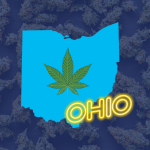
- Building Security and Trust: Verifying Identification and Payments
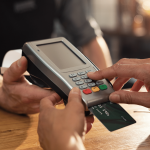
- The Importance of Loss Prevention
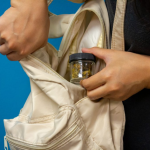
- Thoughts to Improve Cannabis Security Regulations Across the Nation
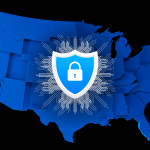
- Opportunities in the Minnesota Cannabis Market
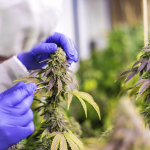
- U.S. Cannabis Legalization 2023 Update
